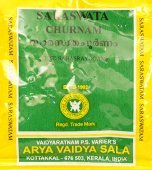Rajanidvaya, Rajanīdvaya, Rajani-dvaya: 2 definitions
Introduction:
Rajanidvaya means something in Hinduism, Sanskrit. If you want to know the exact meaning, history, etymology or English translation of this term then check out the descriptions on this page. Add your comment or reference to a book if you want to contribute to this summary article.
In Hinduism
Ayurveda (science of life)
Toxicology (Study and Treatment of poison)
Source: Shodhganga: Kasyapa Samhita—Text on Visha ChikitsaRajanīdvaya (रजनीद्वय) refers to “two kinds of turmeric”, and is an ingredient used in the treatment (cikitsā) of rat poison (ākhu-viṣa), according to the Kāśyapa Saṃhitā: an ancient Sanskrit text from the Pāñcarātra tradition dealing with both Tantra and Viṣacikitsā—an important topic from Āyurveda which deals with the study of Toxicology (Viṣavidyā or Sarpavidyā).—Kāśyapa has recommended a slew of generic formulae that successfully neutralise rat poison.—According to Kāśyapasaṃhitā (verse 11.55cd-56ab): “A lukewarm drink of milk, Mātula, Kośātaki, pepper, with the two kinds of turmeric (rajanīdvaya) destroys rat-poison”.

Āyurveda (आयुर्वेद, ayurveda) is a branch of Indian science dealing with medicine, herbalism, taxology, anatomy, surgery, alchemy and related topics. Traditional practice of Āyurveda in ancient India dates back to at least the first millenium BC. Literature is commonly written in Sanskrit using various poetic metres.
Languages of India and abroad
Sanskrit dictionary
Source: Cologne Digital Sanskrit Dictionaries: Monier-Williams Sanskrit-English DictionaryRajanīdvaya (रजनीद्वय):—[=rajanī-dvaya] [from rajanī > raj] n. Curcuma Longa and Aromatica, [Suśruta]
Sanskrit, also spelled संस्कृतम् (saṃskṛtam), is an ancient language of India commonly seen as the grandmother of the Indo-European language family (even English!). Closely allied with Prakrit and Pali, Sanskrit is more exhaustive in both grammar and terms and has the most extensive collection of literature in the world, greatly surpassing its sister-languages Greek and Latin.
See also (Relevant definitions)
Partial matches: Dvaya, Rajani.
Full-text: Dvirajani.
Relevant text
No search results for Rajanidvaya, Rajani-dvaya, Rajanī-dvaya, Rajanīdvaya; (plurals include: Rajanidvayas, dvayas, Rajanīdvayas) in any book or story.
Related products

